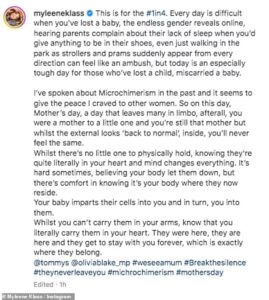Myleene Klass offered her support to those who have had a miscarriage and may find Mother’s Day particularly challenging on Sunday.
The media personality, 44, took to her Instagram to explain the comforting concept of Microchimerism – when your baby imparts their cells into you and in turn, you into them – even if you lose them.
Myleene revealed in October 2020 she had suffered four miscarriages before giving birth to her ‘rainbow baby’ son Apollo, now three.
She penned in her Mother’s Day post: ‘This is for the #1in4. Every day is difficult when you’ve lost a baby, the endless gender reveals online, hearing parents complain about their lack of sleep when you’d give anything to be in their shoes.
‘Even just walking in the park as strollers and prams suddenly appear from every direction can feel like an ambush, but today is an especially tough day for those who’ve lost a child, miscarried a baby.
Kind: Myleene Klass offered her support to those who have had a miscarriage and may find Mother’s Day particularly challenging on Sunday

‘I’ve spoken about Microchimerism in the past and it seems to give the peace I craved to other women. So on this day, Mother’s day, a day that leaves many in limbo, after all, you were a mother to a little one and you’re still that mother but whilst the external looks ‘back to normal’, inside, you’ll never feel the same.
‘Whilst there’s no little one to physically hold, knowing they’re quite literally in your heart and mind changes everything. It’s hard sometimes, believing your body let them down, but there’s comfort in knowing it’s your body where they now reside.
‘Your baby imparts their cells into you and in turn, you into them.
‘Whilst you can’t carry them in your arms, know that you literally carry them in your heart. They were here, they are here and they get to stay with you forever, which is exactly where they belong.’
It comes after last month Myleene – who in addition to Apollo, is mother to daughters Ava, 14, and Hero, 10, – shared a heartwarming video of herself cradling her son Apollo in the delivery room after she gave birth in 2019.
She announced she has become an ambassador for Tommys, the UK’s largest pregnancy and baby loss charity.
In the video, Myleene looked emotional as she cradled Apollo in her arms while her partner Simon Motson gave her a kiss on the forehead.
In a candid post, Myleene told how having four consecutive miscarriages before welcoming Apollo turned her into someone ‘she didn’t recognise’.




The star wrote: ‘I’m sharing this with you because today I became an official ambassador for @tommys.
‘These few seconds reveal the utter trauma, pain, fear and relief after never daring to believe this moment would actually come; that I would finally hold my son in my arms and bring him home.
‘You see the seemingly perfect side of my life a lot on socials but like everything, there is another side and for me, losing a baby near enough every year for four consecutive years turned me into someone I didn’t recognise.
‘When I finally fell pregnant with Apollo, I had gotten to a point where I didn’t believe in my body anymore, seeing a pram in the park, an advert on the train, another gender reveal online, it was mentally debilitating.’
Myleene said she plans to use her ambassadorship with Tommys to campaign for a change in medical intervention for women who have had miscarriages.
She said: ‘It literally took an army for me to get Snoopy. I called @noholdenback (friend and fellow Tommys ambassador) who got me to #PippaNightingale who literally held my hand through it all.
‘Since my 4 miscarriages, I have made a Bafta nominated documentary, Myleene Klass Miscarriage and Me helping to break the taboo and I continue alongside @oliviablake_mp to lobby government to change the current antiquated health care system in place for women experiencing miscarriage.
‘(As it stands, a woman is required to have 3 consecutive miscarriages before she receives medical intervention) and now I am an official ambassador for a charity that constantly pushes forwards with data collection, scientific analysis and ultimately helps women and their partners experiencing miscarriage loss.
‘I never imagined this is the path I would find myself on but I have a voice and a platform that I will continue to use to call for and secure change.
‘The odds currently stand at 1 in 4 pregnancies ending in MC and yet 8000 babies every year can be saved with medical intervention frim progesterone alone. (I myself took this).
‘It would be easier to move on from this and live my life but I owe it to my children, my friends and family who both stood by me and who also experienced this trauma themselves and ultimately to my angel babies, that their limited tiny heartbeats on this earth were not in vain.’


Myleene previously revealed that she holds family chats with her fiancé Simon along with their daughters Ava, 15, and Hero, 11, while keeping things age-relevant for the children.
She said: ‘I think it’s important because these conversations are going on in my house, and I wanted to show that you’re not reckless by bringing your children into this.
‘The conversations I have with my children are very honest, not scary, because you talk about the pure biology.’
What causes a miscarriage?
It is highly unlikely that you will ever know the actual cause of a one-off miscarriage, but most are due to the following problems:
• ABNORMAL FETUS
The most common cause of miscarriages in the first couple of months is a one-off abnormal development in the fetus, often due to chromosome anomalies. ‘It’s not as though the baby is fine one minute and suddenly dies the next,’ says Professor James Walker, Professor of Obstetrics and Gynaecology at the University of Leeds.
‘These pregnancies fail from the outset and were never destined to succeed.’ Most miscarriages like this happen by eight weeks, although bleeding may not start until three or four weeks later, which is worth remembering in subsequent pregnancies. ‘If a scan at eight weeks shows a healthy heart beat, you have a 95 per cent chance of a successful pregnancy,’ says Professor Walker.
• HORMONAL FACTORS
A hormonal blip could cause a sporadic miscarriage and never be a problem again. However, a small number of women who have long cycles and irregular periods may suffer recurrent miscarriages because the lining of the uterus is too thin, making implantation difficult.
Unfortunately, hormone treatment is not terribly successful.
‘There used to be a trend for progesterone treatment, but trials show this really doesn’t work,’ warns Professor Walker. ‘There is some evidence that injections of HCG (human chorionic gonadotrophin, a hormone released in early pregnancy) can help, but it’s not the answer for everyone.’ The treatment must be started as soon as the pregnancy is confirmed, at around four or five weeks.
• AGE
For women over 40, one in four women who become pregnant will miscarry. [One in four women of all ages miscarry, but these figures include women who don’t know that they are pregnant. Of women who do know that they’re pregnant, the figure is one in six. Once you’re over 40, and know that you’re pregnant, the figure rises to one in four]
• AUTO-IMMUNE BLOOD DISORDERS
Around 20 per cent of recurrent miscarriers suffer from lupus or a similar auto-immune disorder that causes blood clots to form in the developing placenta.
A simple blood test, which may need to be repeated several times, can reveal whether or not this is the problem.’One negative test does not mean that a women is okay,’ warns Mr Roy Farquharson, consultant gynaecologist who runs an early pregnancy unit at the Liverpool Women’s Hospital.
Often pregnancy can be a trigger for these disorders, so a test should be done as soon as possible,’ he adds.But it can easily be treated with low dose aspirin or heparin injections, which help to thin the blood and prevent blood clots forming – a recent trial also showed that women do equally well on either. ”We have a 70 per cent live birth rate in women treated for these disorders,’ says Dr Farquharson, ‘which is excellent.’
• OTHER CAUSES
While uterine abnormalities, such as fibroids, can cause a miscarriage, many women have no problems carrying a pregnancy to term. An incompetent cervix can also cause miscarriage at around 20 weeks.
While this can be treated by a special stitch in the cervix, trials suggest it is not particularly successful, although it may delay labour by a few weeks.Gene and chromosomal abnormalities, which can be detected by blood tests, may also cause recurrent miscarriages in a small number of couples.
A procedure known as preimplantation genetic diagnosis can help. After in-vitro fertilisation (IVF), a single cell is taken from the developing embryo and tested for the gene defect. Only healthy embryos are then replaced in the womb.
It is an expensive and stressful procedure – and pregnancy rates tend to be quite low – but for some this is preferable to repeated miscarriages or a genetically abnormal baby.
Source
Share this



